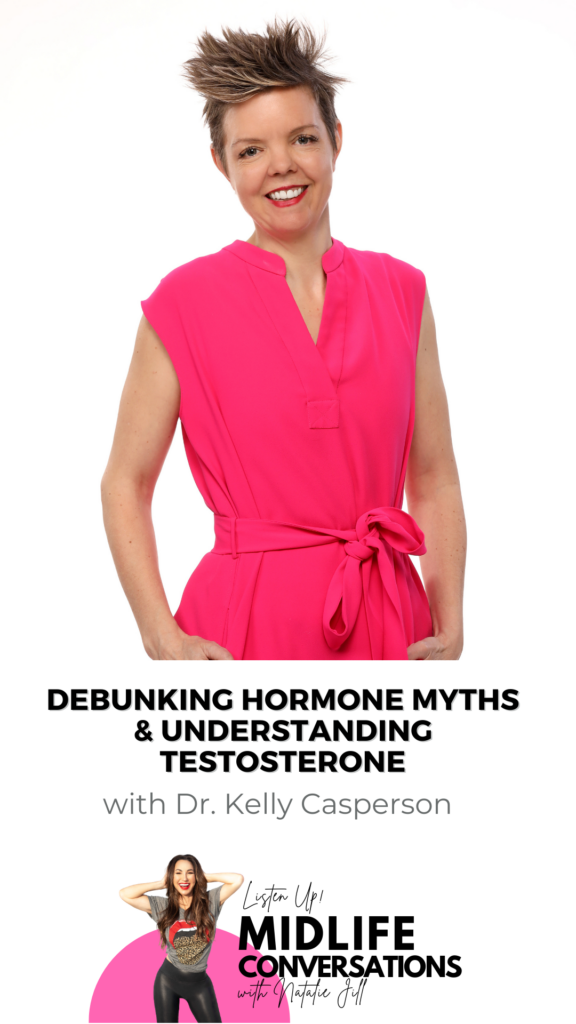04 Feb Debunking Hormone Myths & Understanding Testosterone with Dr. Kelly Casperson
Has your doctor dismissed those midlife symptoms as “just part of aging”? What if those migraines, that frustrating brain fog, and your vanishing sex drive were something you can actually fix?
Meet Dr. Kelly Casperson, a pioneering urologist who’s challenging everything we thought we knew about hormones — like did you know testosterone isn’t JUST for men?! In fact, it might explain why you’re not feeling like yourself lately…
Testosterone plays a vital role in various aspects of women’s health: from brain function, to energy levels, to overall mood – including libido.
From the importance of testosterone for women, bioidentical and synthetic hormones (including birth control), to overall quality of life – Dr. Casperson breaks down what you need to know about taking control of your hormonal health as we age.
 Debunking the “Male Hormone” Testosterone Myth
Debunking the “Male Hormone” Testosterone Myth
It’s common to think that testosterone is a “men’s hormone” because that is where we most commonly hear the two being associated (“men make testosterone and women make estrogen”). This misconception stems from very oversimplified gender-based assumptions in early hormone research, but, contrary to popular belief, testosterone is not exclusively a male hormone. Women actually have four times more testosterone in their bodies than estrogen! (Men just have 10-20x more than women do!) AND another shocking sidenote: MEN also have MORE estrogen than a menopausal woman! Testosterone is actually MADE by the ovaries and then the ovaries make estrogen from it.
The Importance of Testosterone for Women
Testosterone plays a vital role in various aspects of women’s health:
- Brain function: Improved clarity of thought and memory recall
- Energy levels: Reduced afternoon slumps
- Libido: Enhanced sex drive
- Mood: Better overall mood and sense of self
The Challenges of Testosterone Treatment for Women
Despite its major benefits, testosterone treatment for women faces several hurdles:
- Gender bias in medical education and practice (and narrow focused studies)
- Lack of FDA-approved products designed specifically for women which presents its own complications
- Limited training in sexual medicine for doctors
- Focus on “libido” in existing studies – not in other positive effects like bone health and cognition
- It’s not generally covered by insurance for women
What Should Our Testosterone Levels Be?
Blood testing is really NOT the greatest tester for testosterone BUT it is better than saliva and urine. DUTCH tests are the most expensive tests and really aren’t the best for testing testosterone due to there being not much supporting data to show that the metabolization really matters. IF you’re getting blood labs, you can’t get the “male testosterone” lab test if you are a woman – it will for sure not be accurate. Instead, you want to request the Male/Female/Child Testosterone. The optimal woman level of testosterone should be between 60-80…if that makes you feel good! It might be too high for you if you are feeling negative androgenic side effects like acne, anger, losing hair, etc.
Is There A Natural Approach to Testosterone?
There are a lot of lifestyle issues that can affect testosterone in men: stress, sleep, alcohol, exercise, and diet. Those are the 5 pillars of healthy testosterone in men. In women, however, we now outlive our ovaries by a significant number of years. But you can’t yoga your way into ovarian function.
On the same hand, there is no “natural” way to increase testosterone because NATURALLY our hormones decrease as we age. Anything else we do to increase our performance as humans in the developed world, is “unnatural”. Just because something is an over the counter “supplement” doesn’t mean it’s more “natural” than a prescription hormone. With that being said, DHEA is an OTC supplement that likely works better when you are perimenopausal because you still have functioning ovaries and thus, supports the conversion of DHEA.
This and so much more interesting information on other hormones in this episode!
